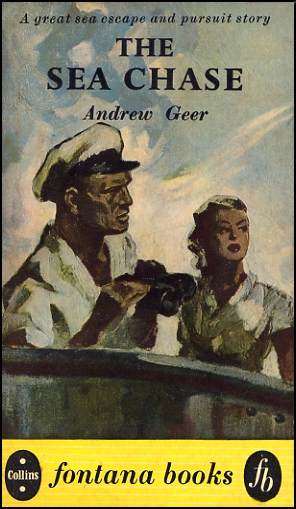Book Review: The Sea Chase by Andrew Geer
Sydney Harbour is bustling on this September day in 1939, but one ship, the Ergenstrasse, lies idle, waiting to fill her sadly depleted coal bunkers. This ship is part of the German merchant marine, and everyone is well aware that it is only a matter of time before Great Britain declares war on Germany. So the Australian harbor officials are “bothering by the book”, using every rule and regulation to hold the Ergenstrasse in their waters until it becomes legal prey for the British Navy.

Finally, the German embassy orders that the Ergenstrasse must sail with its cargo of tungsten ore needed for the war effort, regardless of its fuel situation. The last few sailors on shore leave are called back. Max Heinz, the scullion, broken by tragedy and mustard gas in World War One. Walther Stremme, apprentice officer, who fled a fire-breathing religious father for the relative freedom of the sea, fan of comedic movies. Otto Kirchner, second officer, who is “political” and hopes to curry favor with the Party with sketches he’s made of the Australian defenses.
Captain Karl Erhlich is surprised when a passenger is added to his cargo at the last moment. Elsa Schweppe, a young woman he knew briefly as an hopeful opera singer, now an agent of German Intelligence–a spy! She’s been called back from the relatively safe backwater of Australia to serve in Europe.
The Ergenstrasse is finally able to steam out of harbor, mere hours ahead of the war declaration. Thus begins a chase that will lead from Australia across the Pacific, and then the Atlantic to the North Sea.
This book, loosely based on a real incident at the beginning of World War Two, won a (U.S.) Navy writing contest in 1948 and went on to become a best-seller. In 1955, it was turned into a movie starring a miscast John Wayne as Captain Erhlich and Lana Turner as Elsa.
At first, it’s easy to see the Germans as plucky underdogs. The Ergenstrasse is an unarmed, aging, poorly designed ship with a permanent list and a stupid name up against the British Navy. Most of the crew are perfectly ordinary sailors with dreams and ambitions that don’t involve world conquest or genocide. The one big asset they have is Captain Erhlich, who is a brilliant warship commander unfairly consigned to this duty by politics.
But then Captain Erhlich issues a harsh but understandable command regarding some fishermen stranded at a remote supply depot. When Lieutenant Victor Napier of the Royal Navy reaches the location, we learn how Kirchner interpreted the order, and are reminded, “oh, right. Nazis.”
Captain Erhlich is not anti-Nazi so much as apolitical; he’s on the outs because he misjudged at the end of World War One which political side a particular other captain was on, and offended the man who was going to be in charge of ship assignments after the war. Erhlich is initially appalled to learn that Kirchner has involved him in a war crime, but upon realizing that the success of this voyage would make him a hero of Germany and able to request any ship assignment he wants, starts making “hard decisions” and soon enough is comfortable committing war crimes of his own.
This book is a good example of the villain protagonist. Captain Ehrlich has a personal philosophy which assures him that he is the only person around who is making purely rational decisions, even as it becomes clear that he would sacrifice his principles and everyone around him for the chance to command a warship again. (The dramatic irony of this is that the reader knows the German Navy warships saw relatively little action, most of it losing. I’ll talk more about that in my upcoming review of The Tirpitz.) He’s especially unaware of how his heavy-handedness turns people against him as a group; he thinks of each as a separate problem.
At one point a boat full of Polynesian sailors is seen, and the narrative flashes back to tell us who these people are. We learn of the legendary navigator Noah and his brave crew, including great-grandson Kori, who is going on his first sea voyage. We learn of their proud traditions and deep family ties.
“I teie nie mahana ne tere no oe e Hati Na te Moana.”
And then Captain Erhlich has them all murdered.
Time and again, the Ergenstrasse barely manages to make it through the next obstacle thanks to Captain Erhlich’s brilliance and ruthlessness, but in the final stretch, all the chickens come home to roost.
Content note: As might be expected, there’s a tiny amount of antisemitism. There’s also a fair bit of period sexism.
This is one of those hidden gems that make searching the shelves of used bookstores and digging through boxes at garage sales and estate auctions worthwhile. It hasn’t been reprinted in years, which is a shame as it’s an excellent read for lovers of sea adventure.
And hey, here’s a trailer for the movie.

